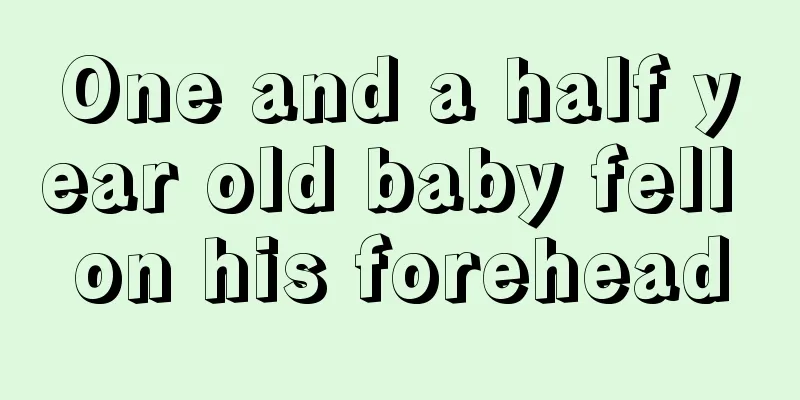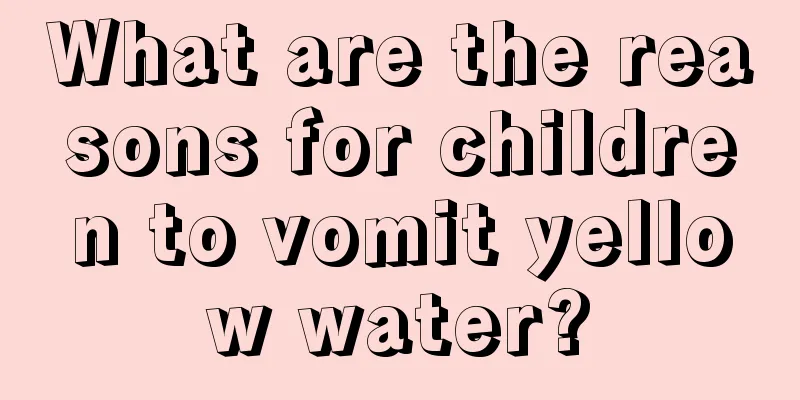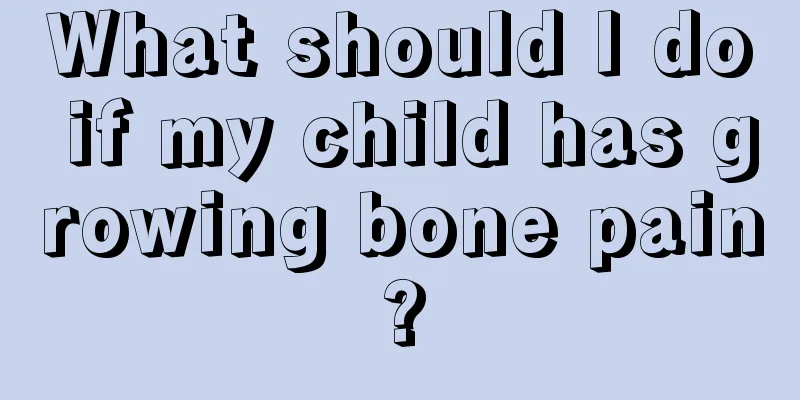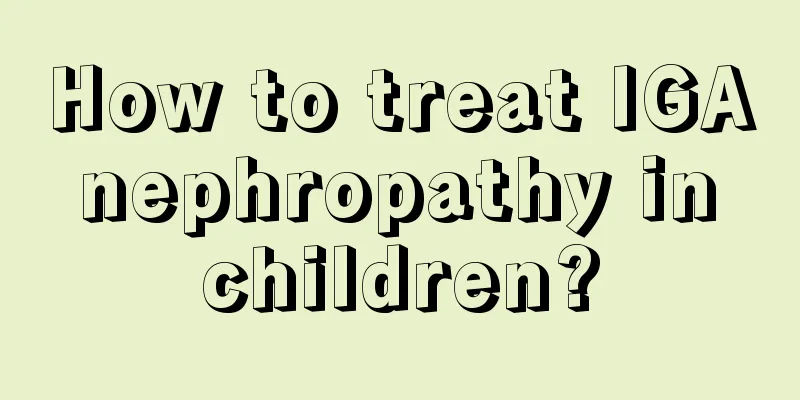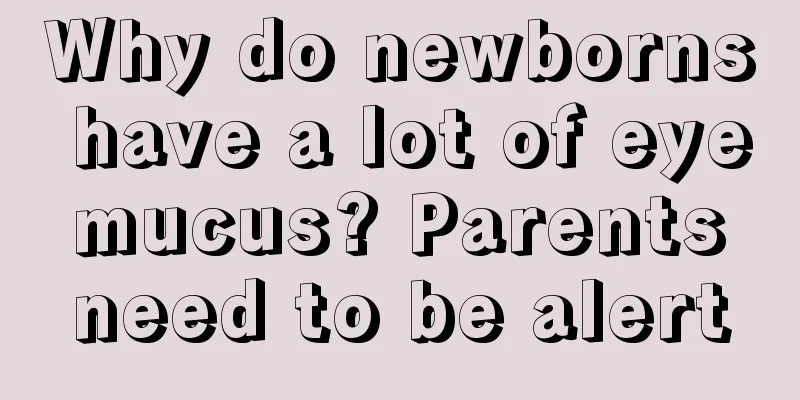What causes dry cough in infants and young children?
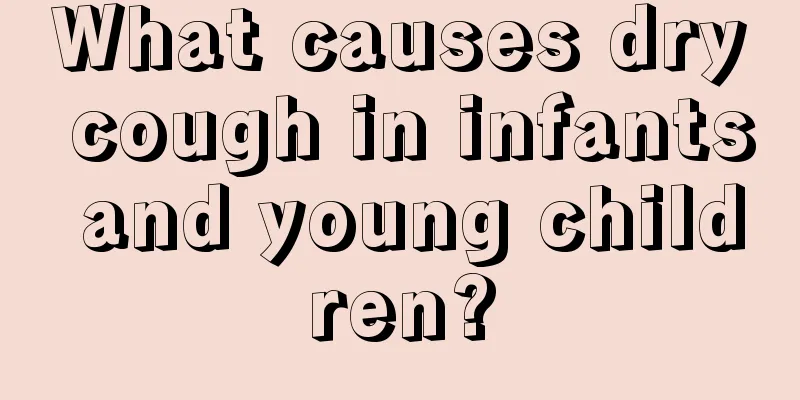
|
Children's health problems are often the most concerned issue for parents. Children often encounter various diseases on the road to growth. Among them, dry cough in infants and young children is a symptom that many parents have encountered. They often don’t know what causes it, let alone what kind of treatment to give their children. Therefore, in order to relieve such symptoms in time and prevent parents from having too much anxiety, let’s take a look at what is causing dry cough in infants and young children. What causes dry cough in infants and young children? Cough caused by upper respiratory tract infection Symptoms: Mostly an irritating cough, like an itchy throat, without phlegm; occurring at any time of day or night, not accompanied by wheezing or shortness of breath. The baby is sleepy and has a runny nose, sometimes accompanied by fever, with the body temperature not exceeding 38℃; poor spirits and loss of appetite. After sweating and fever subside, the symptoms disappear, but the cough may continue for 3-5 days. Cough relief: When children have upper respiratory tract infection, their nasal mucosa is already inflamed. If they inhale dry air, their nasal cavity will become more uncomfortable and their cough will be aggravated. Therefore, to keep the air in the room moist, you can use a humidifier, hang a wet towel, mop the floor with water, or place a basin of clean water in the room to increase the air humidity. If your child's cough and nasal congestion symptoms persist for a week and do not improve, you should take your child to see a doctor as soon as possible. Cough caused by bronchitis Symptoms: Bronchitis usually follows a cold and is caused by a bacterial infection. The cough is accompanied by phlegm and is sometimes severe. The coughing is usually more frequent at night and there is a wheezing sound. The coughing is most severe two hours after the child falls asleep, or around 6 a.m. Cough relief: Go to the hospital for treatment and take pediatric cough suppressants prescribed by the doctor. Children should not eat foods that are too sweet or too salty, otherwise it will aggravate night coughs. Cough caused by pharyngitis Symptoms: Hoarseness, purulent sputum, little is coughed up and most is swallowed. Older babies will complain of sore throats, while babies who cannot express themselves often become irritable, refuse to feed, and make "hollow, hollow" sounds when coughing. Cough relief: In this case, parents should not solve the problem by themselves at home. They should seek medical attention in time and ask the doctor to make a clear diagnosis and provide symptomatic treatment. Allergic cough Symptoms: Continuous or recurrent severe cough, mostly in paroxysmal attacks, more obvious in the morning, coughing worse when the baby is active or crying, children tend to sneeze and cough when exposed to cold air, but with very little sputum. Coughing at night is more severe than during the day and lasts longer, usually lasting for 3 months, more often during the pollen season. Cough relief: Try to prevent your children from catching colds and go to the hospital to consult a doctor. For babies with a family history of asthma or other allergic diseases, special attention should be paid to coughing, and they should seek medical treatment as soon as possible, get a clear diagnosis, and actively treat it to prevent it from developing into asthma. ·Coughing caused by inhalation of foreign matter Symptoms: If the child has no previous symptoms such as coughing, runny nose, sneezing or fever, but suddenly develops severe choking and coughing, has difficulty breathing, and looks pale, especially for younger children, it is possible that the child put some foreign object into his mouth when the adult was not paying attention, and it accidentally entered the throat or trachea. Cough relief: After inhaling foreign objects, parents should encourage their children to cough, and never use their hands to pick around in their mouths to prevent the foreign objects from getting deeper and deeper and completely blocking the airway. If nothing is coughed up and the child coughs or wheezes repeatedly, it means that the foreign body has reached the lower respiratory tract and the child should be taken to the hospital immediately to remove the foreign body in time. How to deal with baby coughing 1. Raise your baby's head at night. 2. Drinking more warm drinks can make the baby's sticky phlegm thinner, relieve the tension of the respiratory mucosa, and promote coughing up phlegm. It is best to let your baby drink warm water or warm milk, rice soup, etc. You can also give your baby fresh fruit juice. The fruit juice should be less irritating such as apple juice and pear juice. It is not advisable to drink citrus juice such as orange juice and grapefruit juice. 3. Steam cough relief method. If your baby has a severe cough, let him/her inhale steam; or hold your baby in a steam-filled bathroom for 5 minutes. The humid air will help clear mucus from your baby's lungs and calm your cough. 4. Use a hot water bag to relieve cough. Fill a hot water bottle with hot water at about 40℃, wrap it with a thin towel, and then apply it to the baby's back near the lungs. This can speed up the expulsion of cold and is especially effective for cough symptoms that appear in the early stages of colds. ·Pediatric massage therapy Pediatric massage therapy refers to the treatment of children's cough-related symptoms through traditional Chinese massage therapy. ·Traditional Chinese medicine treatment When children have runny nose, slight fever, throat discomfort, and decreased appetite, they can take small pills such as Baoyuan Dan and Zhibao Ding, one pill each time, three times a day. If the condition worsens after taking it for one day, you should stop taking the medicine and go to the hospital for diagnosis and treatment in time. If a child's cough is paroxysmal and dry, is not effective with antibiotics, is accompanied by an itchy throat but not a fever, and is afraid of cold air and smoke, and worsens at night, then it may be an allergic cough. Children with low fever, nasal congestion, runny nose, mild cough, etc. can take Miaolingdan, one pill each time, twice a day. If the child has fever, red throat, hoarseness, and the condition is worse than before, you can add children's throat clearing granules or children's cold granules. If a child suddenly develops a fever, you can use some pediatric heat-clearing granules. If the child has a high fever and a history of high fever convulsions, Zixue San can be used first. If the stool is dry and hard, you can use Niuhuang Qingre San once. For children who cough due to colds but without fever, cough syrups such as children's lung clearing oral liquid and children's cough liquid can be used to control the development of the cough. The above is an introduction to what causes dry cough in infants and young children. After understanding it, we know that there are many reasons for dry cough in infants and young children. When such symptoms appear, parents must treat their children based on the cause. If the cause cannot be confirmed, they must take the children to a regular hospital for examination and treatment. In addition, when such symptoms appear, they must be given light food and drink more boiled water. |
<<: What causes dry cough without sputum in children?
>>: What is the jaundice value of infants?
Recommend
Why can't my baby stick out his tongue?
Newborn babies learn about the world through thei...
What are the benefits of eating more vegetables for young children?
Vegetables are foods that we must eat every day i...
Children's leg valgus
Every parent hopes that their child's physica...
Baby cries before going to bed
There are many reasons why babies cry when they s...
What causes baby diarrhea?
I believe that every mother will encounter baby d...
How to first aid when a baby chokes on drinking water
Many mothers will feed their babies some water be...
Symptoms of conjunctivitis in children
If an adult suffers from conjunctivitis, it will ...
What should parents do if their children have cavities in their baby teeth?
Since children do not brush their teeth properly ...
What are the methods to cultivate children's nap habits?
The most annoying thing is that many children cry...
What is vaginal inflammation in young women?
There are many underage women, that is, young gir...
If parents are not tall, can their children grow taller?
The problem of children's height is not only ...
How to care for babies infected with rotavirus
Rotavirus has a very obvious seasonality, which i...
Treatment of infantile tics
According to surveys, the number of patients with...
What to do if your child vomits after eating Aqi
Azithromycin tablets are a common Western medicin...
Sleeping time for babies over 2 months old
Babies over two months old are still in the infan...

